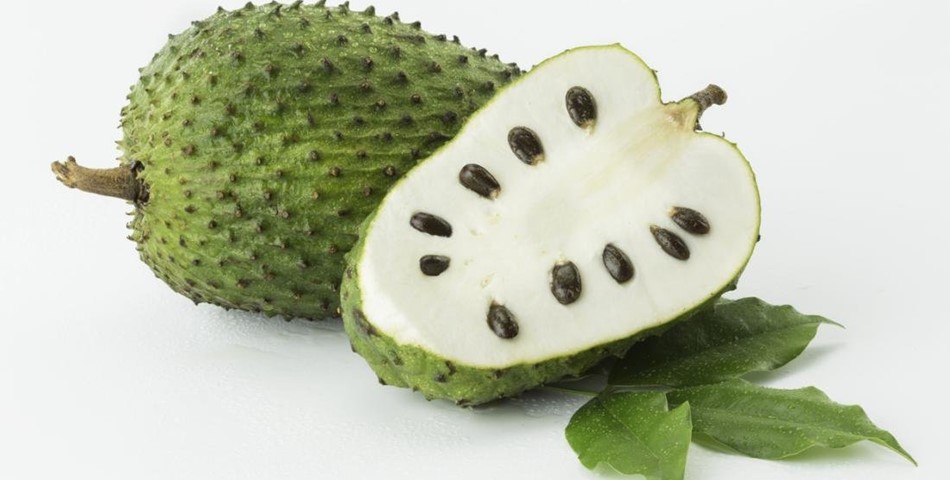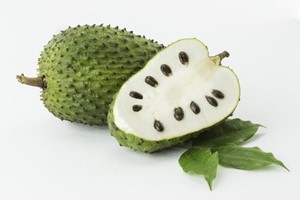Soursop, scientifically known as Annona muricata Lin., is a tropical fruit from the custard apple (Annonaceae) family. Known for its distinctive sweet and sour flavor and creamy texture, soursop is also commonly referred to as graviola, guanabana, or Brazilian paw-paw. This fruit, covered in spiny skin, is not only a popular food source but also a significant component of traditional medicine used to treat various conditions such as arthritis, nervous disorders, and diarrhea. This article provides a comprehensive overview of soursop, its nutritional profile, potential health benefits, and associated risks.
Nutritional Profile of Soursop
Soursop is a nutrient-dense fruit that provides a variety of health-supportive components. A one-cup serving of raw soursop contains:
- Calories: 148
- Protein: 2.25g
- Carbohydrates: 37.8g
- Fiber: 7.42g
- Fat: 0.67g
- Copper: 0.193mg (21% of the Daily Value [DV])
- Iron: 1.35mg (8% DV)
- Magnesium: 47.2mg (11% DV)
- Potassium: 626mg (13% DV)
- Vitamin C: 46.4mg (52% DV)
- Folate: 31.5 micrograms (8% DV)
- Niacin: 2.02mg (13% DV)
Soursop is particularly rich in vitamin C, copper, and potassium, and provides a good source of iron, magnesium, and folate. These nutrients are vital for various bodily functions, including immune support, red blood cell formation, muscle contraction, and blood pressure regulation.
Potential Health Benefits
Antioxidant and Anti-inflammatory Properties
Soursop is known for its high content of antioxidant and anti-inflammatory compounds, which may offer significant health benefits. Antioxidants play a crucial role in protecting cells from damage caused by free radicals, which are highly reactive molecules that can cause oxidative stress. Oxidative stress has been linked to many chronic conditions, including heart disease and certain cancers. The antioxidants in soursop help neutralize free radicals and reduce cellular damage to lipids, proteins, and DNA.
The fruit contains several protective plant compounds, such as sesquiterpenes, phenolic compounds, acetogenins, and alkaloids. Phenolic compounds like coumaric acid possess powerful antioxidant properties. Additionally, acetogenins in soursop have shown potential anticancer effects, though more research is required to confirm these benefits.
High in Vitamin C
Soursop is an excellent source of vitamin C, with one cup providing 52% of the Daily Value. Diets rich in vitamin C are associated with a lower risk of diseases related to oxidative stress, such as certain cancers, heart disease, and neurodegenerative diseases. Vitamin C also has anti-inflammatory properties, which can be particularly beneficial for individuals with inflammatory conditions like arthritis and inflammatory bowel disease (IBD).
Supports Digestive Health
Soursop's high fiber content is essential for maintaining good digestive health. One cup of soursop provides 7.42 grams of fiber, meeting 26.5% of daily fiber requirements. The fruit contains both insoluble and soluble fiber. Insoluble fiber adds bulk to stool, promoting regular bowel movements, while soluble fiber helps soften stool by drawing water into it.
Studies suggest that a high-fiber diet can protect against digestive tract cancers, including stomach and colorectal cancer. A review found that increased fiber intake is linked to a reduced risk of these types of cancers.
May Promote Healthy Blood Pressure Levels
Soursop contains bioactive compounds that may help lower blood pressure. Some research indicates that these compounds inhibit an enzyme called angiotensin-I-converting enzyme (ACE), which regulates blood pressure. A study involving 143 individuals with borderline high blood pressure found that consuming seven ounces of soursop juice daily for three months significantly reduced blood pressure levels compared to a control group. This suggests that incorporating soursop products, such as juice, into the diet may help manage blood pressure and prevent hypertension. However, more research is needed to understand the role of soursop in blood pressure management fully.
Rich in Essential Minerals
In addition to vitamins, soursop is a good source of essential minerals like copper, potassium, iron, and magnesium. Copper is vital for red blood cell formation, iron metabolism, growth, development, and energy production. Potassium is essential for muscle contraction and blood pressure regulation, and a diet low in potassium is associated with a higher risk of developing high blood pressure, heart disease, and osteoporosis.
Potential Risks and Considerations
Despite its nutritional benefits, consuming soursop may pose certain risks due to its acetogenin content. While acetogenins have anticancer properties, they can be toxic in large quantities. Some studies suggest that long-term consumption of soursop may increase the risk of atypical parkinsonism, a group of neurological conditions similar to Parkinson's disease. Regular consumption of soursop has been linked to higher rates of atypical parkinsonism in the French Caribbean islands. Additionally, acetogenins may worsen the severity of degenerative parkinsonism, including Parkinson's disease.
Given these potential risks, it is advisable to consume soursop and soursop products sparingly. Individuals with neurological conditions, such as Parkinson's disease, should consult a healthcare provider before including soursop in their diet.
Tips for Consuming Soursop
Soursop is popular in regions like South America and the Caribbean, where it is enjoyed in various recipes, including ice cream, jams, jellies, and candies. The fruit can also be consumed as juice or added to smoothies and shakes. When preparing raw soursop, it is essential to handle the seeds with care, as they are toxic.
How to Prepare Raw Soursop:
- Choose a ripe soursop with yellowish-green skin that is soft to the touch.
- Wash the fruit under running water to remove dirt.
- Peel the skin off using a knife.
- Cut the fruit in half lengthwise and remove the seeds.
- Enjoy the fruit raw or use it to make juice, ice cream, sorbet, or smoothies.
Soursop can be purchased from specialty stores, farmer's markets, or online, depending on your location.
Soursop, or guanabana, is a nutritious fruit with a variety of health benefits, including high antioxidant and anti-inflammatory properties, digestive health support, and potential blood pressure regulation. However, its acetogenin content may pose risks, especially for individuals with neurological conditions. It is essential to consume soursop in moderation and consult healthcare professionals when in doubt. With its rich nutrient profile and potential health benefits, soursop can be a valuable addition to a balanced diet when consumed responsibly.
By: Jillian Kubala
https://www.health.com/













